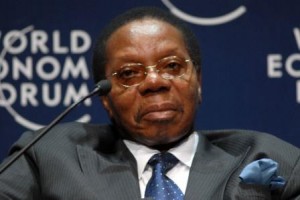 At a time when democracy is gaining footholds in Africa with more elections and fewer dictatorships, Bingu wa Mutharika is accused of riding a counter-current: the return of the big man.
At a time when democracy is gaining footholds in Africa with more elections and fewer dictatorships, Bingu wa Mutharika is accused of riding a counter-current: the return of the big man.
The president of Malawi has made bitter enemies of opposition parties, civil society, churches and the media, a situation compounded last year when his security forces killed at least 18 people after pro-democracy protests turned violent.
Britain’s high commissioner described him as “becoming ever more autocratic and intolerant of criticism” – and was expelled in retaliation.
It is a charge Bingu vehemently rejects. “It’s total nonsense because there’s no country in sub-Saharan Africa that is as free as Malawi,” Bingu, 77, told the Guardian.
“People can make statements against the head of state, people can insult the head of state. They call me names – some of them even heckle me at public meetings. I haven’t arrested them.”
Bingu was speaking at the presidential palace in Blantyre, named after the Scottish birthplace of explorer David Livingstone.
He entered a wood-panelled room in suit and tie and sat, unsmiling, in a regal red chair under a crystal chandelier and the gaze of his own framed portrait. Four twitchy, stiff-backed staff stood deferentially throughout the 50-minute interview.
Bingu alleged that “foreign agents” were plotting regime change in Malawi and pledged to relinquish power in 2014. He described a personal hinterland of fishing, writing screenplays and listening to Handel’s Hallelujah Chorus.
The former World Bank technocrat, a darling of the international donor community after his 2004 election, is now condemned by democracy watchdogs for concentrating power in his own hands, attacking freedoms and bullying critics.
Human rights activists say they have been physically assaulted and had their homes petrol-bombed, cars vandalised and offices ransacked.
George Soros’s Open Society Initiative for Southern Africa warns that Malawi is heading towards an “authoritarian era” under the “dictatorial whims of one man”. He even redesigned the national flag. At a symposium it posed the question: “Will we see another Zimbabwe in Malawi?”
Bingu bridled at the suggestion of creeping tyranny. “Malawi and Zimbabwe can never be the same,” he insisted. “The political system is different, the economics are totally different.
“What they are trying to do is to draw a parallel between the leadership of Zimbabwe and Malawi. There is no basis for that. That is totally unfair and uncalled for. I have been very democratic.
“From 2004 until now, there is no single political prisoner in a Malawian jail. Is that consistent with the restriction of democracy in this country? We have been very democratic, we have been very patient. I have asked the opposition to come and see me but they refuse.
“It is simply not true. Because if it were true, all these people would have been rounded up. None of them have. They are free now. If indeed Malawi was starting to be a police state, would they still be walking free? That’s the question.”
But there has been a collapse of trust between Bingu and civil society groups, who say he is dangerously out of touch with public anger at the recent economic slump in Malawi, one of the world’s poorest countries.
When anti-government demonstrations erupted last July, at least 18 people were killed by police – some shot in the back as they fled – and journalists were beaten. It was one of Malawi’s darkest days.
Bingu says that western interests were pushing for a coup, with a “shadow cabinet” primed to take over.
“There are foreign elements here that are paying NGOs to cause havoc in order to get regime change,” he said. “It was foolish on the part of the western interests to do this because they themselves are preaching that we should be more democratic, but they come in and foment this kind of trouble.
“There was already a government in waiting – some people already had a cabinet, a vice-president and ministers.
“A shadow cabinet was established here hoping that on 20 July this government would fall and they’d take over. It’s unconstitutional. They are the ones that are destroying democracy because they have to wait and respect the constitution.”
Asked to identify the forces conspiring for his overthrow, Bingu replied: “I have no idea. But there are foreign agents, I know, because some of them [civil society activists] could not even afford slippers.
“Suddenly they can afford to buy a business class ticket and go round the US and stay in posh hotels, when they couldn’t afford a slipper. Where has the money come from? And you know, they are not employed, so clearly someone must be funding them.”
Bingu, who has built strong ties with China, forgives but does not forget the leaked diplomatic cable from the then British high commissioner, Fergus Cochrane-Dyet, that branded him “autocratic”, resulting in tit-for-tat expulsions.
“The question is, if my high commissioner used the same term in Britain against authorities there, would that be taken lying down? That’s all I have to say.”
The president of this former British protectorate did, however, say any new high commissioner would be “very welcome” and he has accepted an invitation to the Queen’s diamond jubilee.
Unlike Robert Mugabe in Zimbabwe, Bingu has vowed to step down in two years’ time, although it is widely predicted he will simply hand over power to his brother Peter, now foreign minister.
“I will leave Malawi better than I found it, but I am retiring in 2014. Is that not democracy? What demonstration of democracy is there more than that? An autocrat has no timeframe, can stay forever.
“And here am I, saying voluntary retirement, and yet I’m called an autocrat, I’m called a tyrant, I’m called anti-democratic. All these adjectives are not fair because things on the ground do not support these adjectives.”
If he stays true to his word and retires, Bingu will have time to indulge his private passions. “I write a lot, I write like crazy,” he said with a smile. “I’ve got now probably five manuscripts, I wrote some of them 600 pages.”
His works include an “interracial novel” and two film screenplays based on the Bible.
Bingu also enjoys tribal music and classical music: “Beethoven, Tchaikovsky, Bach. Classical music is quite soothing and comforting. If I had to pick up one, I like Handel’s Hallelujah Chorus. That one, you can sing it 100 times, I won’t get tired, because I think it’s something that is immortal.”
One of Bingu’s most curious legacies will be his tribute to an infamous predecessor. He ordered the construction of a mausoleum for Malawi’s first president, the notorious despot Hastings Banda, whose honorary name he adopted: Ngwazi (“the conqueror”).
Bingu’s explanation possibly reveals the most about his philosophy: “I don’t know whether you can change the minds of those who regard him as a dictator, because it depends upon the definition of what a dictator is.
“Sometimes discipline can be mistaken for dictatorship. Many people believe that, without discipline, you really can’t go anywhere. So to what extent he was a dictator, or to what extent he was a strict disciplinarian, I really do not know.”
